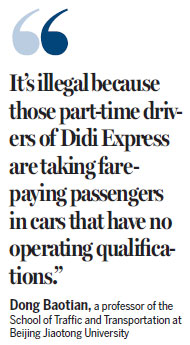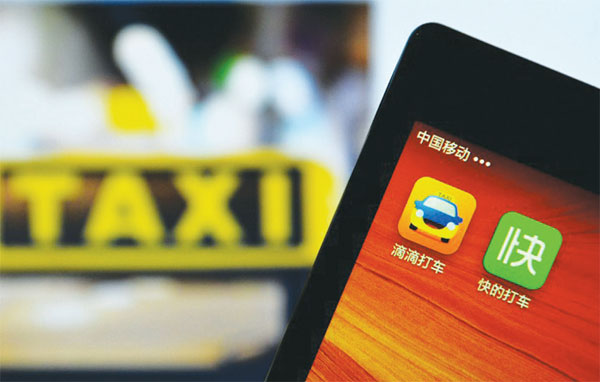Didi Kuaidi in the fast lane as taxis slow down on mainland
Updated: 2015-06-03 07:41
By Zhou Mo in Shenzhen(HK Edition)
|
|||||||||
Xie Wanda had been a driving instructor since 2006. Last month, he quit his job and signed up with a transportation network that operates the popular car-booking app Didi Kuaidi in Shenzhen.
He works full-time at the new job, which he believes is much more rewarding financially.
"I expect to make a net profit of 10,000 yuan ($1,614) or so every month," Xie said.
Didi Kuaidi - the mainland's most popular taxi-hailing app - is the brainchild of startup tech firms Didi Dache and Kuaidi Dache, which merged earlier this year to form one of the world's largest smartphone-based transport services.
Didi Kuaidi has been well-known in Shenzhen for offering a range of services, including Didi Express, which is cheaper than premium car services.
Didi Kuaidi launched its carpooling service in Beijing on Monday. It also aims to expand the service to 26 mainland cities, including Shenzhen, by the end of this month. More than 1 million people have already registered as carpooling drivers, the company said.
In an effort to grab the competitive car-booking market, Didi Kuaidi announced on May 22 it would invest 1 billion yuan to subsidize passengers and car drivers who use its Didi Express service. Every Monday of the week from May 25 to June 15, passengers in 12 mainland cities, including Shenzhen and Guangzhou, are entitled to a 15-yuan discount for each ride for up to two times.
The first Monday was really a busy day for Xie. He received almost 20 orders in half a day and earned more than 500 yuan in just a few hours.
What attracted Xie weren't not only the fares, but also the generous economic incentives offered by the company. He said the incentives usually amount to 2.5 times the cab fare for any one trip.
Results of the latest survey by Analysys International, a provider of information products, show that orders from Didi premium-car service accounted for 78.3 percent of the market total in the first quarter of this year.
Didi Kuaidi currently covers 360 cities and 1.35 million drivers, with daily calls in excess of 4 million. Premium-car service, meanwhile, covers 61 cities and 400,000 drivers, with up to 1.5 million daily calls.
The advent of various types of car-booking services has troubled taxi drivers, who complain that their business has been badly eroded.
Taxi driver Wu De used to work on the 7 pm to 4 am shift every day, earning an average of about 10,000 yuan a month in Shenzhen. But now, he can only make roughly 6,000 yuan working the same shift.
"Night-shift drivers like us have been the hardest hit because many people become premium-car drivers after work," Wu said.
For that reason, many taxi drivers have joined the car-calling services. But the legal status of such services has remained unclear as most of the operating vehicles are private cars.
In Guangzhou and Chengdu, the legality of the popular car-calling app operator Uber was questioned by authorities. In Wuhan, Didi Kuaidi was asked by regulatory departments to disallow private cars from providing services.
"It's illegal because those part-time drivers of Didi Express are taking fare-paying passengers in cars that have no operating qualifications," said Dong Baotian, a professor of the School of Traffic and Transportation at Beijing Jiaotong University.
"Right now, it can just be seen as a kind of an experiment. How the situation develops will depend on the attitude of the regulatory authorities, the taxi industry's tolerance and whether we're able to find a way to address taxi-calling difficulties during peak hours while, at the same time, not disrupting the industry's normal business," he said.
Service is another point of concern. As a number of drivers are new comers or part-time workers, they are not familiar with the roads.
"In the short term, the company can only draw customers by offering economic incentives. But, in the long run, it should rely on good service to retain its app users," Dong said.
sally@chinadailyhk.com

|
Taxi drivers on the mainland are already feeling the pinch amid stiff competition from burgeoning car-hailing apps. Asia News Photo |
(HK Edition 06/03/2015 page10)
